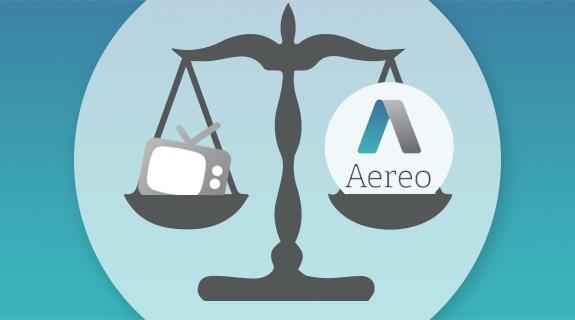The Big Four networks scored a major ally Monday in their looming Supreme Court fight against Aereo, with the Obama Administration coming out on the side of the broadcasters.
The Justice Department and the U.S. Copyright Office co-authored a Friend of the Court brief, meaning that two branches of the federal government are siding with the broadcasters as they gear up for their argument in front of the third branch. The copyright office is an arm of the Library of Congress, part of the legislative branch.
“The proper resolution of this dispute is straightforward. Unlike a purveyor of home antennas or the lessor of hilltop space on which individual consumers may erect their own antennas, [Aereo] does not simply provide access to equipment or property that facilitates customers’ reception of broadcast signals,” the government brief states. “Rather, [Aereo] operates an integrated system—i.e. a ‘device or process’—whose functioning depends on its customers’ shared use of common facilities.”
Each of the Big Four networks have sued to put a stop to Aereo, which rents out a small antenna to users that transmits broadcast television to multiple devices such as smartphones.
Ther broadcasters say the IAC-backed startup is illegally retransmitting television; Aereo says it is simply renting remote antennas.
The specific question before the High Court is “whether a company ‘publicly performs’ a copyrighted television program when it retransmits a broadcast of that program to thousands of paid subscribers over the Internet.”
With a looming April 22 date before the U.S. Supreme Court, Aereo CEO Chet Kanojia said in a new interview Monday that he is confident in his side’s argument in the ongoing legal fight over the legality of his service.
In an interview with Time Magazine, Kanojia dismissed as not “serious” the broadcasters’ threat to pull free over-the-air TV if they lost at the High Court.
“There are nearly 60 million people who are using over-the-air access. So the networks would have to make a business decision that they are willing to cut off 60 million people,” Kanojia told Time.
He said there was no question his service was legal.
“Nobody disputes the fact that a customer can have an antenna. Nobody disputes the fact that a customer can make a recording for herself or himself in their home, and as a result of the Cablevision case, they can make a recording in a remote location as well,” Kanojia said. “Nobody is disputing that this system or combination of technologies that lots of companies sell today and make a profit on is perfectly legitimate. The debate is about how long the wire is between the user and the source of their recordings.”
He said a defeat for Aereo could throw the future of cloud computing and other tech advances in doubt.
Not so fast, argued the Obama Administration on Monday.
One function of cloud storage services, the Administration argued, is to provide consumers more numerous and convenient ways of playing back copies of content they have already legally acquired.
Aereo, they argue, provides an entirely different function, and acts more like traditional cable and satellite providers.
“[Aereo] provides a means by which consumers can gain access to copyrighted content in the first instance—the same service that cable companies have traditionally provided.”
The Administration told the Court that there is no reason a ruling against Aereo would threaten cloud storage services or other technology “that assist consumers in hearing or viewing their own lawfully-owned copies.”
Read More: Time, The Hollywood Reporter
Brief Take: The broadcasters gain an important ally in the Obama Administration, who defend copyright holders while signaling they aren’t trying to stifle innovation.
Read the full brief below:
Tags:













































__twocolumncontent.jpg)











